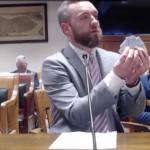
Concepcion will continue setting the agenda—but only until the next Cannabis Control Commission meeting
Today’s Massachusetts Cannabis Control Commission meeting saw a brief return to disformity, as commissioners spent nearly two hours debating who should take the helm as acting chair.
The scene during the remote meeting echoed bickering from Sept. 18, when the four current commissioners met for the first time following the suspension of CCC Chair Shannon O’Brien by State Treasurer Deb Goldberg. That news broke shortly after an embarrassing rift between O’Brien and CCC Executive Director Shawn Collins during a public meeting, and amidst calls by state lawmakers for increased oversight of the “dysfunctional” agency.
With O’Brien gone, commissioners Nurys Camargo, Bruce Stebbins, Kimberly Roy, and Ava Callender Concepcion struggled to select a leader in September. Roy, who is the appointed secretary of the body, expected to assume the role as she had done on past occasions when the chair was absent. But Camargo and Concepcion rejected the motion, leaving the body split without a fifth member.
After their contentious exchange in September, the members compromised on appointing Concepcion as the acting chair for their scheduled regulatory meetings through November. At the time, commissioners were on deadline to draft new regulations to, among other changes, improve municipal transparency and accountability, as required by An Act Relative to Equity in the Cannabis Industry (Chapter 180) passed by state lawmakers last year. Those new regulations were promulgated today.
With a temporary chair and also an acting executive director in place, the CCC completed their complicated regulatory rewrite ahead of deadline, jumped into social consumption, and released their annual report highlighting noteworthy achievements. But they still don’t have permanent leadership and won’t have that issue settled soon, with O’Brien scheduled for a sit-down with the treasurer on Dec. 5.
And with O’Brien still gone and Concepcion’s interim appointment expired, commissioners got to scrapping this morning. And they were right back to where they started nearly two months ago—talking in circles in an attempt to tap a temp chair.
Concepcion opened today’s discussion by thanking her colleagues for the opportunity to lead, noting that she ran eight consecutive meetings including 30-plus hours of back-to-back rule-rewriting sessions. Stebbins thanked her for her service, saying that she helped things run efficiently and gave the group a “unified voice.” But in motioning to seat a chair moving forward until the O’Brien suspension is resolved, Stebbins passed up Concepcion and instead nominated Roy, arguing that it’s the prudent move to proceed as the body had done under former commissioners.
Roy agreed, saying, “There is precedent. I’m here to support this.” But the motion failed after Camargo and Concepcion voted against it.
Next came Camargo’s first motion of the day—“to designate Commissioner Concepcion as acting chair until further notice from the treasurer’s office” about O’Brien. “We’re in uncharted territory,” Camargo said, “and I think we’re all in agreement that Commissioner Concepcion did an amazing job of walking us through … and moving us forward.” “We’re a handful,” Camargo added, commending Concepcion on managing effectively. “I think you’re the best person right now to be the chair.”
After that motion met the same 50-50 fate of prior attempts, Stebbins tried to reset in the name of reaching consensus: “We’re going to need to resolve this conversation and move forward. I think all four of us carry an incredible responsibility and have shown that we can collaborate and work well together, and each of us brings tremendous experience to the roles. Is there any interest or thoughts from my colleagues about potentially rotating the chair’s responsibility?”
Concepcion asked Stebbins to share his concerns about her staying in charge, saying she “intentionally led in a collaborative and mindful way.” In response, Stebbins said he wants “to be mindful of past practice.” To which Camargo rebutted, “I personally think that we need consistency, and it’s working right now. … It is an uncomfortable conversation, and we need to keep doing it, and it sucks. But the reality of it is that we have so much work to do.”
“Debate and disagreement is healthy, it’s good,” Roy said at this point, about 30 minutes into the negotiations. “The legislature created us as a five-person board to avoid deadlock, but [today] we have a deadlock. … I would implore this body to come up with a compromise solution. … Everyone has that skill set here. I will propose a motion for the acting chair to have a rotating basis until we have a resolution on the status of the permanent chair.”
“I understand the compromise we are trying to do,” Camargo said, “but I want to be mindful of the impact that would have as far as consistency.” She had no interest in rotating chairs, and instead motioned to re-appoint Concepcion as acting chair until their Dec. 14 meeting. The proposal failed, as did subsequent motions including one to keep Concepcion through Dec. 31, then rotate the chairmanship in alphabetical order on a quarterly basis as needed.
Faced with yet another deadlock and a lack of interest in rotating chairs, the four commissioners finally agreed to keep Concepcion in charge through the December meeting, then revisit the same conversation at that time. Roy rejected the motion.
“It feels like you’re buying time,” Roy said to Camargo. “We’re going to be in the same conundrum on Dec. 14. It feels like it’s not a compromise and it just creates more instability.”
At a media availability after the meeting, commissioners made clear that there is no official policy or bylaw that designates an acting chair in these circumstances. “It’s up to us as far as understanding who is the right person,” Concepcion said.
“Although it was an unwritten policy it was an agreed upon policy that the secretary would chair in the absence of a chair. And it has been deployed many times,” Roy said. “Today we came up with a quasi-compromise. Hopefully when we meet again it’s not Groundhog Day.”
























